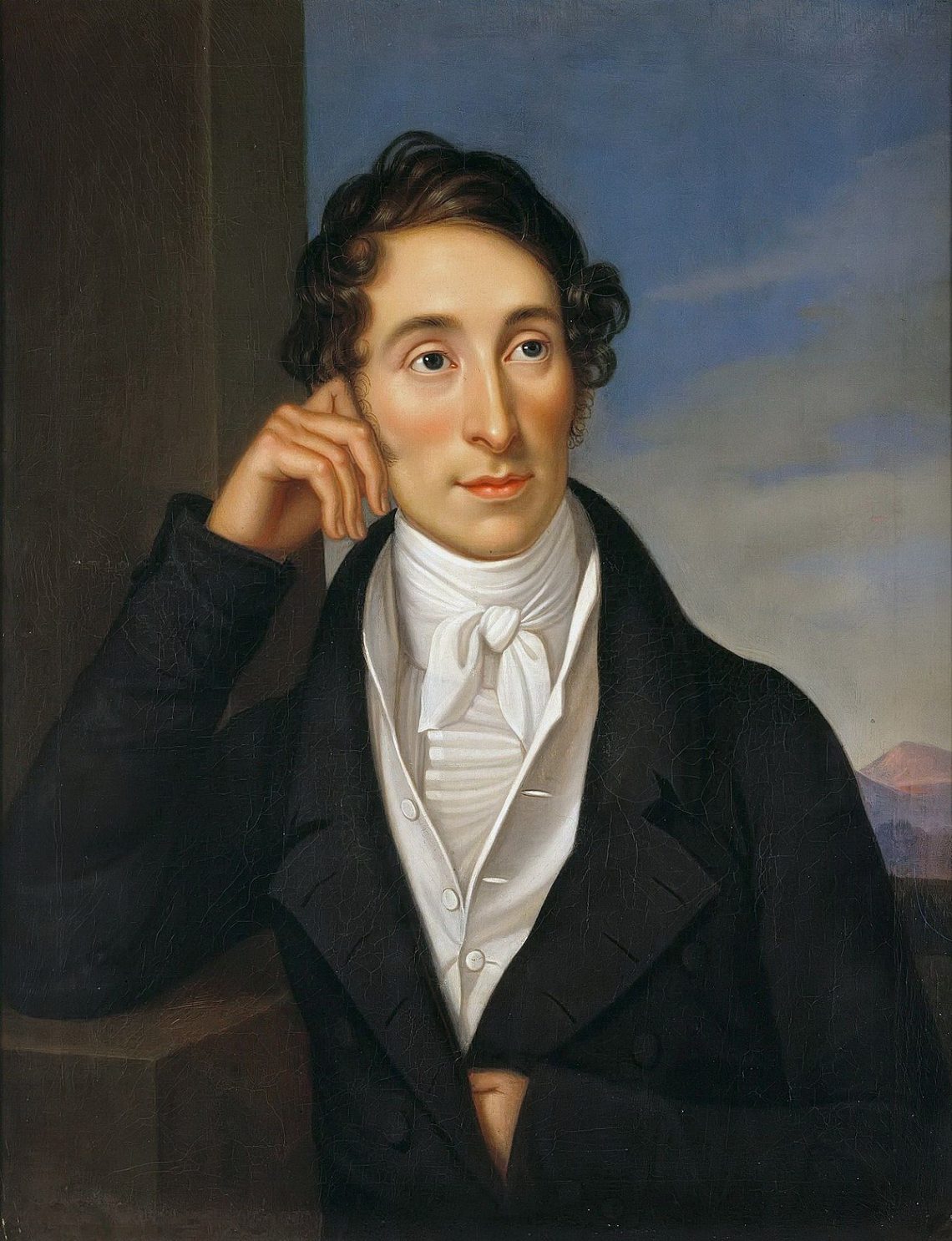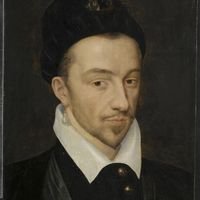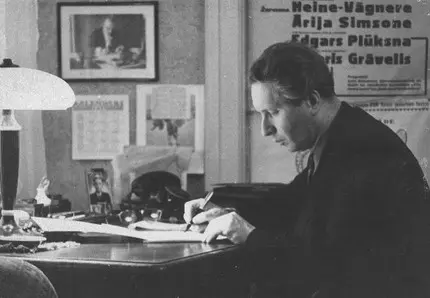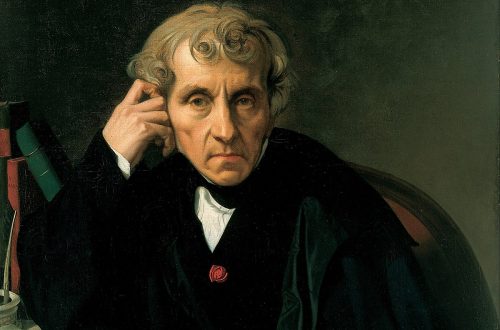
Carl Maria von Weber |
Carl Maria von Weber
“The world – the composer creates in it!” – this is how the field of activity of the artist was outlined by K. M. Weber – an outstanding German musician: composer, critic, performer, writer, publicist, public figure of the early XNUMXth century. And indeed, we find Czech, French, Spanish, Oriental plots in his musical and dramatic works, in instrumental compositions – stylistic signs of gypsy, Chinese, Norwegian, Russian, Hungarian folklore. But the main business of his life was the national German opera. In the unfinished novel The Life of a Musician, which has tangible biographical features, Weber brilliantly characterizes, through the mouth of one of the characters, the state of this genre in Germany:
In all honesty, the situation with the German opera is very deplorable, it suffers from convulsions and cannot stand firmly on its feet. A crowd of assistants bustle around her. And yet, barely recovering from one swoon, she again falls into another. In addition, by making all sorts of demands on her, she was so puffed up that not a single dress fits her anymore. In vain, gentlemen, the remodelers, in the hope of decorating it, put on it either a French or an Italian caftan. He doesn’t suit her front or back. And the more new sleeves are sewn to it and the floors and tails are shortened, the worse it will hold on. In the end, a few romantic tailors came up with the happy idea of choosing for it native matter and, if possible, weaving into it everything that fantasy, faith, contrasts and feelings have ever created in other nations.
Weber was born into a musician’s family – his father was an opera bandmaster and played many instruments. The future musician was shaped by the environment in which he was from early childhood. Franz Anton Weber (uncle of Constance Weber, W. A. Mozart’s wife) encouraged his son’s passion for music and painting, introduced him to the intricacies of performing arts. Classes with famous teachers – Michael Haydn, brother of the world-famous composer Joseph Haydn, and Abbot Vogler – had a noticeable impact on the young musician. By that time, the first experiments of writing also belong. On the recommendation of Vogler, Weber entered the Breslau Opera House as a bandmaster (1804). His independent life in art begins, tastes, beliefs are formed, large works are conceived.
Since 1804, Weber has been working in various theaters in Germany, Switzerland, and has been director of the opera house in Prague (since 1813). During the same period, Weber established connections with the largest representatives of the artistic life of Germany, who largely influenced his aesthetic principles (J. W. Goethe, K. Wieland, K. Zelter, T. A. Hoffmann, L. Tieck, K. Brentano, L. Spohr). Weber is gaining fame not only as an outstanding pianist and conductor, but also as an organizer, a bold reformer of the musical theater, who approved new principles for placing musicians in an opera orchestra (according to groups of instruments), a new system of rehearsal work in the theater. Thanks to his activities, the status of the conductor changes – Weber, taking on the role of director, head of the production, participated in all stages of the preparation of the opera performance. An important feature of the repertory policy of the theaters he headed was the preference for German and French operas, in contrast to the more usual predominance of Italian ones. In the works of the first period of creativity, the features of the style crystallize, which later became decisive – song and dance themes, originality and colorfulness of harmony, freshness of orchestral color and interpretation of individual instruments. Here is what G. Berlioz wrote, for example:
And what an orchestra that accompanies these noble vocal melodies! What inventions! What ingenious research! What treasures such inspiration opens before us!
Among the most significant works of this time are the romantic opera Silvana (1810), the singspiel Abu Hasan (1811), 9 cantatas, 2 symphonies, overtures, 4 piano sonatas and concertos, Invitation to Dance, numerous chamber instrumental and vocal ensembles, songs (over 90).
The final, Dresden period of Weber’s life (1817-26) was marked by the appearance of his famous operas, and its real culmination was the triumphal premiere of The Magic Shooter (1821, Berlin). This opera is not only a brilliant composer’s work. Here, as in focus, are concentrated the ideals of the new German operatic art, approved by Weber and then becoming the basis for the subsequent development of this genre.
Musical and social activities required the solution of problems not only creative. Weber, during his work in Dresden, managed to carry out a large-scale reform of the entire musical and theatrical business in Germany, which included both a targeted repertoire policy and the training of a theater ensemble of like-minded people. The reform was ensured by the musical-critical activity of the composer. The few articles he wrote contain, in essence, a detailed program of romanticism, which was established in Germany with the advent of The Magic Shooter. But in addition to its purely practical orientation, the composer’s statements are also a special, original musical piece clothed in a brilliant artistic form. literature, foreshadowing articles by R. Schumann and R. Wagner. Here is one of the fragments of his “Marginal Notes”:
The seeming incoherence of the fantastic, reminiscent not so much of an ordinary piece of music written according to the rules, as of a fantastic play, can be created … only by the most outstanding genius, the one who creates his own world. The imaginary disorder of this world actually contains an inner connection, permeated with the most sincere feeling, and you just need to be able to perceive it with your feelings. However, the expressiveness of music already contains a lot of indefiniteness, individual feeling has to invest a lot in it, and therefore only individual souls, tuned literally to the same tone, will be able to keep up with the development of feeling, which takes place like this, and not otherwise, which presupposes such and not other necessary contrasts, for which only this opinion is true. Therefore, the task of a true master is to reign imperiously over both his own and other people’s feelings, and the feeling that he conveys to reproduce as a constant and endowed only those colors and nuances that immediately create a holistic image in the soul of the listener.
After The Magic Shooter, Weber turns to the genre of comic opera (Three Pintos, libretto by T. Hell, 1820, unfinished), writes music for P. Wolf’s play Preciosa (1821). The main works of this period are the heroic-romantic opera Euryanta (1823), destined for Vienna, based on the plot of a French knightly legend, and the fairy-tale-fantastic opera Oberon, commissioned by the London theater Covent Garden (1826). The last score was completed by the already seriously ill composer right up to the very day of the premiere. The success was unheard of in London. Nevertheless, Weber considered necessary some alterations and changes. He didn’t have time to make them…
Opera became the main work of the composer’s life. He knew what he was striving for, her ideal image was suffered by him:
… I’m talking about the opera that the German craves, and this is an artistic creation closed in itself, in which the parts and parts of related and in general all used arts, soldering to the end into one whole, disappear as such and to a certain extent are even destroyed, but on the other hand building a new world!
Weber managed to build this new – and for himself – the world …
V. Barsky
- Weber’s life and work →
- List of works by Weber →
Weber and the National Opera
Weber entered the history of music as the creator of the German folk-national opera.
The general backwardness of the German bourgeoisie was also reflected in the belated development of the national musical theater. Until the 20s, Austria and Germany were dominated by Italian opera.
(The leading position in the opera world of Germany and Austria was occupied by foreigners: Salieri in Vienna, Paer and Morlacchi in Dresden, Spontini in Berlin. While among the conductors and theatrical figures people of German and Austrian nationality gradually advanced, in the repertoire of the first half of the 1832th century continued Italian and French music dominated.In Dresden, the Italian opera house survived until 20, in Munich even until the second half of the century.Vienna in the XNUMXs was in the full sense of the word an Italian opera colony, led by D. Barbaia, impresario of Milan and Naples (The fashionable German and Austrian opera composers Mayr, Winter, Jirovets, Weigl studied in Italy and wrote Italian or Italianized works.)
Only the latest French school (Cherubini, Spontini) competed with it. And if Weber managed to overcome the traditions of two centuries ago, then the decisive reason for his success was the broad national liberation movement in Germany at the beginning of the XNUMXth century, which embraced all forms of creative activity in German society. Weber, who possessed an immeasurably more modest talent than Mozart and Beethoven, was able to implement in the musical theater the aesthetic precepts of Lessing, who in the XNUMXth century raised the banner of struggle for national and democratic art.
A versatile public figure, propagandist and herald of national culture, he personified the type of advanced artist of the new time. Weber created an operatic art that was rooted in German folk art traditions. Ancient legends and tales, songs and dances, folk theatre, national-democratic literature – that’s where he drew the most characteristic elements of his style.
Two operas that appeared in 1816 – Ondine by E. T. A. Hoffmann (1776-1822) and Faust by Spohr (1784-1859) – anticipated Weber’s turn to fairy-tale-legendary subjects. But both of these works were only harbingers of the birth of the national theater. The poetic images of their plots did not always correspond to the music, which remained mainly within the limits of the expressive means of the recent past. For Weber, the embodiment of folk-tale images was inextricably linked with the renewal of the intonational structure of musical speech, with the characteristic colorful writing techniques characteristic of the romantic style.
But even for the creator of the German folk-national opera, the process of finding new operatic images, inextricably linked with the images of the latest romantic poetry and literature, was long and difficult. Only three of Weber’s later, most mature operas – The Magic Shooter, Euryant and Oberon – opened a new page in the history of German opera.
* * *
The further development of the German musical theater was hindered by the public reaction of the 20s. She made itself felt in the work of Weber himself, who failed to realize his plan – to create a folk-heroic opera. After the death of the composer, the entertaining foreign opera once again occupied a dominant position in the repertoire of numerous theaters in Germany. (Thus, between 1830 and 1849, forty-five French operas, twenty-five Italian operas, and twenty-three German operas were staged in Germany. Of the German operas, only nine were by contemporary composers.)
Only a small group of German composers of that time – Ludwig Spohr, Heinrich Marschner, Albert Lorzing, Otto Nicolai – were able to compete with the countless works of the French and Italian opera schools.
The progressive public was not mistaken about the transitory significance of the German operas of that period. In the German music press, voices were repeatedly heard calling on composers to break the resistance of the theatrical routine and, following in the footsteps of Weber, create a truly national operatic art.
But only in the 40s, during the period of a new democratic upsurge, did Wagner’s art continue and develop the most important artistic principles, first found and developed in Weber’s mature romantic operas.
V. Konen
- Weber’s life and work →
The ninth son of an infantry officer who devoted himself to music after his niece Constanza married Mozart, Weber receives his first music lessons from his half-brother Friedrich, then studies in Salzburg with Michael Haydn and in Munich with Kalcher and Valesi (composition and singing). At the age of thirteen, he composed the first opera (which has not come down to us). A short period of work with his father in musical lithography follows, then he improves his knowledge with Abbot Vogler in Vienna and Darmstadt. Moves from place to place, working as a pianist and conductor; in 1817 he marries the singer Caroline Brand and organizes a German opera theater in Dresden, as opposed to the Italian opera theater under the direction of Morlacchi. Exhausted by great organizational work and terminally ill, after a period of treatment in Marienbad (1824), he staged the opera Oberon (1826) in London, which was received with enthusiasm.
Weber was still the son of the XNUMXth century: sixteen years younger than Beethoven, he died almost a year before him, but he seems to be a more modern musician than the classics or the same Schubert … Weber was not only a creative musician, a brilliant, virtuoso pianist, conductor of the famous orchestra but also a great organizer. In this he was like Gluck; only he had a more difficult task, because he worked in the squalid environment of Prague and Dresden and had neither a strong character nor the undeniable glory of Gluck …
“In the field of opera, he turned out to be a rare phenomenon in Germany – one of the few born opera composers. His vocation was determined without difficulty: already from the age of fifteen he knew what the stage required … His life was so active, so rich in events that it seems much longer than Mozart’s life, in reality – only four years ”(Einstein).
When Weber introduced The Free Gunner in 1821, he greatly anticipated the romanticism of composers such as Bellini and Donizetti who would appear ten years later, or Rossini’s William Tell in 1829. In general, the year 1821 was significant for the preparation of romanticism in music: at this time, Beethoven composed the Thirty-first Sonata op. 110 for piano, Schubert introduces the song “King of the Forest” and begins the Eighth Symphony, “Unfinished”. Already in the overture of The Free Gunner, Weber moves towards the future and frees himself from the influence of the theater of the recent past, Spohr’s Faust or Hoffmann’s Ondine, or the French opera that influenced these two of his predecessors. When Weber approached the Euryanta, Einstein writes, “his sharpest antipode, Spontini, had already, in a sense, cleared the way for him; at the same time, Spontini only gave the classical opera seria colossal, monumental dimensions thanks to crowd scenes and emotional tension. In Evryanta a new, more romantic tone appears, and if the public did not immediately appreciate this opera, then composers of the next generations deeply appreciated it.
The work of Weber, who laid the foundations of the German national opera (along with Mozart’s The Magic Flute), determined the double meaning of his operatic heritage, which Giulio Confalonieri writes well about: “As a faithful romantic, Weber found in legends and folk traditions a source of music devoid of notes but ready to sound… Along with these elements, he also wanted to freely express his own temperament: unexpected transitions from one tone to the opposite, a daring convergence of extremes, coexisting with each other in accordance with the new laws of romantic Franco-German music, were brought to the limit by the composer, spiritual whose condition, due to consumption, was constantly restless and feverish. This duality, which seems to be contrary to stylistic unity and actually violates it, gave rise to a painful desire to get away, by virtue of the very choice of life, from the last meaning of existence: from reality – with it, perhaps, reconciliation is supposed only in the magical Oberon, and even then partial and incomplete.
G. Marchesi (translated by E. Greceanii)





